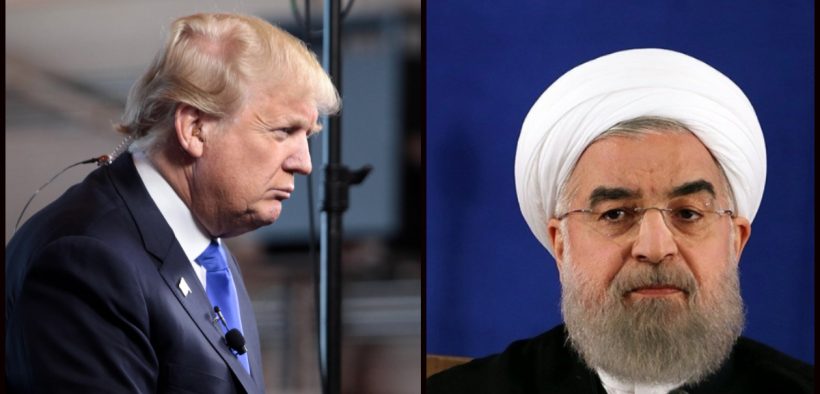Saudi Oil Attack Ignites Fears Of US-Iran Conflict

An attack on Saudi Arabian oil facilities has renewed fears of a looming US-Iran conflict, despite claims of responsibility by Houthi rebels in Yemen.
Devastating drone strikes on Saudi Arabia’s state-run oil facilities on Saturday have spiked global oil prices and ramped up tensions between the United States and Iran, with the former blaming the latter for the attack, a charge the Islamic Republic steadfastly denies.
Iranian-supported Houthi rebels in Yemen took credit for the drone strikes, calling them a retaliation for civilian massacres caused by the U.S.-backed Saudi coalition’s attacks on the famine-plagued country.
US Blames Iran
U.S. Secretary of State Mike Pompeo, who is en route to Saudi Arabia to discuss the U.S. response, quickly blamed Iran for the strikes, saying there’s “no evidence the attacks came from Yemen”. U.S. officials released satellite photos of the damaged facility they claim prove the attack must have been launched from Iran and Iraq, and argue that Houthis lack sufficient weaponry to carry out such a damaging attack. “Iran has now launched an unprecedented attack on the world’s energy supply,” Pompeo said.
President Trump said the U.S. was “locked and loaded” to retaliate against the culprit and “waiting to hear from the Kingdom as to who they believe was the cause of this attack, and under what terms we would proceed,” prompting condemnation from critics at the president’s deference to the totalitarian state.
“Saudi Arabia oil supply was attacked,” Trump tweeted on Sunday. “There is reason to believe that we know the culprit, are locked and loaded depending on verification, but are waiting to hear from the Kingdom as to who they believe was the cause of this attack, and under what terms we would proceed!”
On Tuesday Vice-President Mike Pence warned, “The United States of America will take whatever action is necessary to defend our country, our troops, and our allies in the Gulf. You can count on it.”
Trump Criticized For Allegiance to Saudi Arabia
Lawmakers like Rep. Tulsi Gabbard, Rep. Ruben Gallego, and Sen. Bernie Sanders mocked Trump’s tweet and response to the oil facility attacks.
“You don’t ask Saudi Arabia about how to proceed,” tweeted Rep. Gallego. “You ask Congress. You do not have the authority to attack any other country on behalf of Saudi Arabia without getting permission first from Congress. (FYI the answer will be no)”
“Mr. Trump, the Constitution of the United States is perfectly clear,” tweeted Sen. Sanders. “Only Congress—not the president—can declare war. And Congress will not give you the authority to start another disastrous war in the Middle East just because the brutal Saudi dictatorship told you to.”
“Trump awaits instructions from his Saudi masters,” tweeted Rep.Tulsi Gabbard. “Having our country act as Saudi Arabia’s bitch is not ‘America First.'”
Saudi Arabia’s reputation was damaged by the savage execution of Washington Post journalist Jamal Khashoggi last year. The bipartisan resolution to end U.S. support for the Saudi coalition in Yemen, which was vetoed by Trump, reflects a broad desire to avoid another Middle Eastern war, especially one at the bidding of Saudi Arabia.
There are ‘Hawks’ Who Want a US-Iran Conflict
Still, U.S.-condoned Israeli airstrikes against Iranian-backed forces in Lebanon, Iraq, and Syria have escalated in the last month, providing a plausible motive for Iranian support of the attack on the Saudi oil facility. Middle East Eye quoted an unnamed senior Iraqi intelligence official claiming that the attack was done by Iranian drones launched from Iraq, retaliating against the Saudi-funded Israeli drone strikes.
“The latest attack comes for two reasons: another message from Iran to USA and its allies that as long as its siege on Iran continues no one will have stability in the region. However, the second more direct reason is a strong Iranian revenge for the recent Israeli attacks by drones launched from SDF-controlled areas in Syria against pro-Iranian Hashd bases,” the source told Middle East Eye.
Iraq denies the claim. Saudi Arabia invited international experts to investigate the attack on Monday.
“There are hawks in Iran and America and in the region who want military conflicts,” a senior Iranian government official, who asked not to be named because of the sensitivity of the topic, told Al Jazeera.
“Such attacks will make a military confrontation inevitable and that is what hardliners in Iran and elsewhere want. Such confrontation will harm not only Iran but all the countries in the Persian Gulf.”
While analysts have praised the recent firing of Iran hawk John Bolton as a significant factor lowering the likelihood of full-fledged U.S.-Iran conflict, it is unclear how many shocks the volatile region can take before conflicts worsen.
“Firing war hawks like John Bolton is a step in the right direction, but if the Trump administration is interested in de-escalation, it needs to stop pursuing hawkish policies and pressure campaigns that ultimately force Iran to choose between submission and confrontation,” Pouya Alimagham, a historian of the modern Middle East at the Massachusetts Institute of Technology (MIT), told Al Jazeera.
“After all, it is not hard to imagine what path a nation with a modern history of resistance to western intervention would take under such circumstances.”












It’s absurd to suggest that the United States will obey Saudi Arabia’s bidding. It will obey Israel’s bidding, as always.
“Shalom”? Not as long as Israel is #1 destabilizing force in the Middle East and AIPAC controls Congress, the White House, and the Pentagon.
Israel dba USA, too, of course.